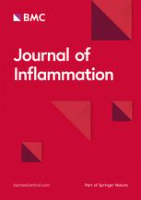
Journal of Inflammation-London
Scope & Guideline
Fostering Global Collaboration in Inflammation Science
Introduction
Aims and Scopes
- Mechanistic Studies of Inflammation:
The journal emphasizes research that investigates the cellular and molecular mechanisms underlying inflammation, including the roles of various signaling pathways, immune cell types, and inflammatory mediators. - Therapeutic Interventions:
There is a strong focus on the development and evaluation of novel therapeutic strategies aimed at modulating inflammatory responses in various diseases, including autoimmune disorders, respiratory conditions, and cardiovascular diseases. - Clinical Implications of Inflammation:
The journal publishes studies that bridge the gap between laboratory findings and clinical applications, highlighting how insights into inflammatory mechanisms can inform treatment strategies and improve patient outcomes. - Environmental and Lifestyle Factors:
Research addressing the impact of environmental factors, such as air pollution and tobacco smoke, on inflammation and related diseases is a core area of focus, reflecting the journal's commitment to understanding the broader context of inflammatory conditions. - Emerging Biomarkers and Diagnostics:
The journal promotes studies that identify and validate biomarkers associated with inflammation, facilitating early diagnosis and monitoring of inflammatory diseases.
Trending and Emerging
- Inflammasome Research:
There is a significant increase in studies focusing on the role of inflammasomes in various inflammatory diseases, highlighting their importance as therapeutic targets and biomarkers. - Microbiome and Inflammation:
Research exploring the connections between the microbiome and inflammation is gaining traction, indicating a growing interest in how gut health and microbial interactions influence inflammatory processes. - Neuroinflammation:
The journal is increasingly publishing studies on neuroinflammation, particularly in the context of neurodegenerative diseases and brain injuries, underscoring the importance of inflammation in neurological health. - Personalized Medicine Approaches:
Emerging themes include the application of personalized medicine in the treatment of inflammatory diseases, with a focus on tailoring therapies based on individual patient profiles and genetic backgrounds. - Environmental and Lifestyle Impact on Inflammation:
There is a rising interest in how environmental factors, such as pollution and diet, affect inflammatory responses, reflecting a broader understanding of inflammation in the context of public health.
Declining or Waning
- Traditional Anti-Inflammatory Drugs:
Research focusing on conventional anti-inflammatory medications is decreasing, possibly due to a shift towards exploring novel therapeutic agents and biologicals that offer more targeted approaches to inflammation. - Single-Agent Studies:
There is a noticeable decline in studies investigating the efficacy of single-agent therapies, as the trend moves towards combination therapies and multi-targeted approaches to manage inflammation. - Basic Animal Models:
The use of basic animal models for inflammation studies is becoming less frequent, with a growing emphasis on more complex models that better mimic human disease states and responses.
Similar Journals

INFLAMMATION
Transforming Understanding of Inflammatory MechanismsINFLAMMATION is a prestigious journal dedicated to advancing our understanding of inflammatory processes in health and disease, published by Springer/Plenum Publishers. Established in 1975, it has transitioned through significant developments in the field, with converged publication years extending from 1975 to 2005 and again from 2007 to 2024. Notably, the journal holds a commendable impact factor within its categories, ranking in Q2 for both Immunology and Immunology and Allergy in 2023, and achieving high Scopus rankings, placing it in the 77th and 75th percentiles respectively. Designed to disseminate cutting-edge research, the journal invites original research articles, reviews, and clinical studies that explore various aspects of inflammation, making it a crucial resource for researchers, healthcare professionals, and students aiming to stay abreast of the latest advancements and insights in the field.
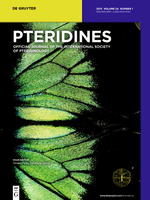
PTERIDINES
Unlocking the Secrets of Pteridines in Health and DiseasePTERIDINES is a unique journal dedicated to the study of pteridines and their implications in biochemistry and clinical research. Published by DE GRUYTER POLAND SP Z O O, this Open Access journal has been a vital resource since its inception in 1989, steadily evolving to include a diverse range of topics pertinent to molecular medicine and biochemistry. With its current classification in the Q4 quartile for Biochemistry, Clinical Biochemistry, and Molecular Medicine, PTERIDINES offers a platform for researchers and professionals seeking to disseminate and access groundbreaking findings. Although the journal has a modest Scopus ranking, it serves as an important outlet for both emerging and established scholars in the field, particularly those focusing on the biochemical roles of pteridines. Based in Germany, the journal invites contributions from around the globe, providing equitable access to all readers since 2018, making significant strides towards inclusive scientific discourse. As such, PTERIDINES is a valuable asset for anyone engaged in the exploration of pteridines and their multifaceted roles in health and disease.
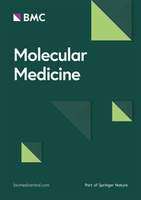
MOLECULAR MEDICINE
Advancing the Frontiers of Genetics and Molecular BiologyMOLECULAR MEDICINE, published by SPRINGER, is a leading scholarly journal dedicated to advancing the fields of genetics and molecular biology with a focus on clinical applications. Since its inception in 1994, it has evolved to become a pivotal platform for disseminating innovative research findings, achieving a remarkable Q1 ranking in multiple categories, including Genetics, Molecular Biology, and Molecular Medicine as of 2023. Featuring an Open Access model since 2000, the journal ensures that cutting-edge research is freely available to the global scientific community, facilitating collaboration and knowledge exchange. With a commitment to high-quality peer-reviewed content, MOLECULAR MEDICINE serves as an essential resource for researchers, healthcare professionals, and students seeking to stay at the forefront of molecular research and its implications for medical science. For those interested in contributing to or accessing vital research in this dynamic field, MOLECULAR MEDICINE stands out as a premier choice.

Immunotherapy Advances
Transforming patient care through innovative immunotherapeutic insights.Immunotherapy Advances, published by Oxford University Press, stands at the forefront of the rapidly evolving field of immunology and microbe interactions, focusing specifically on novel immunotherapeutic strategies and their clinical applications. Established in 2021, this peer-reviewed journal aims to disseminate high-quality research that contributes to the understanding and advancement of immunotherapeutic techniques, potentially transforming patient care in immunology. With a current Scopus rank of #140 out of 236 in the realm of Immunology, placing it in the 40th percentile, Immunotherapy Advances is positioned to be an integral resource for researchers, healthcare professionals, and students eager to stay updated with groundbreaking findings and methodologies. The journal is dedicated to fostering innovative discussions and collaborations, ensuring open access to vital research that influences treatment paradigms globally.

ImmunoTargets and Therapy
Advancing Immunology, Transforming TherapiesImmunoTargets and Therapy is a leading open access journal published by DOVE MEDICAL PRESS LTD, dedicated to advancing the field of immunology and its various therapeutic applications. Since its inception in 2012, the journal has rapidly become a vital resource for researchers, professionals, and students, achieving notable recognition with a Q1 ranking in both Immunology and Immunology and Allergy categories as of 2023. With an impressive Scopus ranking of #22 out of 233 in Medicine - Immunology and Allergy, and #25 out of 236 in Immunology and Microbiology, this journal maintains a 90th percentile standing in its field. ImmunoTargets and Therapy not only publishes original research articles, reviews, and clinical studies, but also fosters an inclusive platform for the dissemination of innovative findings critical to the fight against immunological disorders. Based in New Zealand, it serves a global audience, promoting knowledge exchange and collaboration through its open access model.
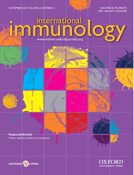
INTERNATIONAL IMMUNOLOGY
Exploring the Frontiers of Immune Science Since 1989.INTERNATIONAL IMMUNOLOGY, published by OXFORD UNIV PRESS, stands out as a premier journal in the field of immunology, providing a vital platform for disseminating groundbreaking research and innovative developments within the discipline. With an impressive Q1 ranking in Immunology and Allergy, as well as in Medicine (miscellaneous), it consistently showcases high-impact studies that contribute to the advancement of immunological knowledge. The journal spans over three decades, from its inception in 1989 to its ongoing contributions as of 2024, thus solidifying its reputation in the scientific community. Researchers, professionals, and students will find valuable articles that delve into the complexities of immune responses, therapeutic interventions, and emerging immunological paradigms, ensuring INTERNATIONAL IMMUNOLOGY remains at the forefront of knowledge in the life sciences.

JOURNAL OF CLINICAL INVESTIGATION
Elevating clinical investigation through rigorous scholarship.JOURNAL OF CLINICAL INVESTIGATION is a premier scholarly journal published by the American Society for Clinical Investigation, dedicated to advancing the field of clinical research and medicine since its inception in 1945. With an impressive impact factor and ranked Q1 in the field of Medicine (miscellaneous), it stands out as a leading source of high-quality research, reflecting its exceptional position in Scopus ranking as #13 out of 636 in General Medicine, placing it in the 98th percentile. The journal focuses on groundbreaking studies that explore the underlying mechanisms of human disease, facilitating a deeper understanding that drives clinical practice and innovation. Although it is not an open-access journal, the insights and findings published in this esteemed journal are essential reading for researchers, healthcare professionals, and students aspiring to contribute to the dynamic landscape of clinical investigation. Published in the United States, it continues to shape the dialogue and advancement within the medical community through its rigorous peer-review process and commitment to excellence.

Immuno
Empowering Discoveries in Immunology, Biochemistry, and GeneticsWelcome to Immuno, a pioneering open-access journal published by MDPI that serves as a key platform for the dissemination of innovative research in the fields of immunology, biochemistry, and genetics. Established in 2021, this journal has rapidly established itself within the academic community, currently ranking in the 53rd percentile in Medicine (miscellaneous) and 50th percentile in Biochemistry, Genetics, and Molecular Biology according to Scopus metrics. With a commitment to advancing our understanding of immune mechanisms and their applications in health and disease, Immuno is dedicated to publishing high-quality peer-reviewed articles that contribute valuable insights to both researchers and practitioners. Positioned in the heart of Switzerland, its global accessibility and diverse editorial board are a testament to its aim to promote knowledge exchange among scientists, practitioners, and students alike. Explore the latest discoveries and advancements in immunological research through Immuno, where your contributions help shape the future of this critical area of study.
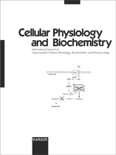
CELLULAR PHYSIOLOGY AND BIOCHEMISTRY
Pioneering Insights into Cellular ProcessesCellular Physiology and Biochemistry is a premier Open Access journal published by the prestigious Cell Physiol Biochem Press GmbH & Co, dedicated to advancing research in the fields of physiology, biochemistry, and molecular biology. Since its inception in 1987 and transitioning to an Open Access model in 2013, the journal has established itself as a vital resource for the dissemination of high-quality research and reviews, showcasing innovative methodologies and groundbreaking findings in cellular processes. With an impressive ranking in the 2023 Scopus category as Q2 in Physiology and a robust percentile of 61, Cellular Physiology and Biochemistry is committed to fostering academic dialogue among researchers, professionals, and students alike. This journal not only provides unrestricted access to its articles, but also promotes the global sharing of knowledge, which is essential for the advancement of our understanding in these vital scientific areas. The journal's editorial team is dedicated to ensuring the highest standards of academic rigor and relevance, making it an indispensable addition to the libraries of those engaged in the life sciences.
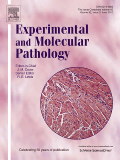
EXPERIMENTAL AND MOLECULAR PATHOLOGY
Pioneering research for a healthier tomorrow.EXPERIMENTAL AND MOLECULAR PATHOLOGY, a distinguished journal published by Academic Press Inc Elsevier Science, is recognized for its significant contributions to the fields of pathology, clinical biochemistry, and molecular biology. With an ISSN of 0014-4800 and an E-ISSN of 1096-0945, this journal provides a platform for the dissemination of high-quality research articles, reviews, and experimental studies that deepen our understanding of disease mechanisms and diagnostic pathways. Since its inception in 1962 and through its converged publication years, the journal has consistently maintained a solid impact in the academic community, achieving high Scopus rankings—ranked #15 in the field of Pathology and Forensic Medicine and #22 in Clinical Biochemistry, showcasing a commendable percentile standing of 93rd and 81st respectively in 2023. The journal is accessible through various academic libraries and institutional subscriptions, making it an essential resource for researchers, professionals, and students committed to advancing knowledge in these critical areas. With a categorization that includes Q1 rankings in Pathology and Forensic Medicine, EXPERIMENTAL AND MOLECULAR PATHOLOGY stands as a prominent venue for pioneering scientific inquiry and collaborative advancement in molecular diagnostics and therapeutic strategies.